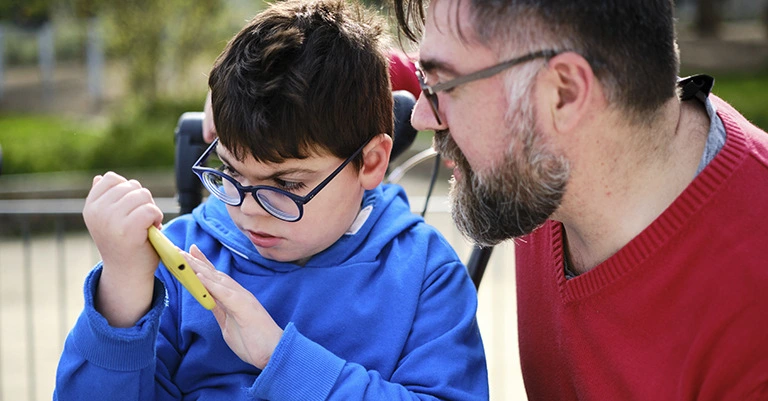Have you heard the phrase, “You can’t pour from an empty cup?” It essentially means that to effectively take care of others, you have to take care of yourself. But caregivers of children with complex medical conditions (CMC) or children and youth with special healthcare needs (CYSHCN) are often so focused on the well-being and comfort of their child, that very little time is spent thinking about self-care for the caregivers themselves.
These children represent a population diagnosed with chronic physical, developmental, behavioral, and emotional conditions.
According to a 2022 summary of the Maternal and Child Health Bureau’s National Survey of Children’s Health1, more than 14 million children in the U.S. had special healthcare needs, and among those ages 3 to 17, more than half (51%) had a current mental health or behavioral diagnosis, such as ADHD, depression, or anxiety.2
While caring for children with complex needs is one of the most rewarding jobs in the world, without enough help, support, and self-care, caregivers may be headed toward their own physical and emotional health issues. Here, we offer self-care tips for caregivers of children with complex needs.
Why self-care is important for caregivers of children with complex needs
In fact, research has shown that parents of children with complex medical conditions are five times more likely to report dealing with poor or fair mental health than parents of kids without these conditions.3
Not only that, but the effects of chronic stress — feeling overwhelmed and pressured for long periods of time — has been found to result in:
- Digestive problems
- Headaches
- Muscle tension and pain
- Heart disease, heart attack, high blood pressure, and stroke
- Sleep problems
- Weight gain
- Problems with memory and focus4
Six self-care tips for caregivers of children with complex needs
Self-care isn’t selfish, and it’s important to address these physical and emotional issues so you can stay healthy and balanced for both yourself and your family. Below are some self-care tips and strategies for caregivers of children with complex needs.
1. Practice breathing and meditation
It sounds incredibly basic, but remembering to breathe and changing the rhythm of your breath — especially in moments of high stress — can have a positive effect on your body’s response to that stress.5 When you find yourself overwhelmed, take in a deep breath for five seconds, and exhale for five seconds, repeating as necessary.
Deep, mindful breathing is also the foundation of meditation, a practice that has been around for thousands of years. There is no “right or wrong” way to meditate; it’s a matter of finding what works best for you, whether that’s dedicating 10 minutes at night, creating a mantra, or using an app like Headspace for guided meditation.6 It can be done wherever you are, whenever you have a few minutes to focus and reset — whether you’re at home after the kids are in bed or waiting in the doctor’s office.
2. Get enough sleep
Sleep is essential to well-being. Yet it’s estimated that between 50 million to 70 million adults in the U.S. meet the medical criteria for sleep deprivation, which means getting less than seven to nine hours a night.7 The result is every system in the body is affected, from your immune system to your brain.
To help ensure you’re restoring your body and mind:
- Try to go to bed at the same time each night
- Avoid caffeine and alcohol in the evenings
- Limit the amount of time spent in front of a screen or bright lights close to bedtime
- Aim to take a warm shower or bath in the evening to regulate body temperature8
3. Focus on diet and exercise
Something as simple as 30 minutes a day of moderate aerobic activity like brisk walking can do more than just strengthen bones and muscles. It’s also been found to improve the health of your brain, reduce the risk of disease, help maintain weight, improve sleep, reduce the risk of anxiety and depression, and even increase lifespan.9 Plus, those 30 minutes a day to yourself can provide a much-deserved break to recharge and refresh.
Along with regular exercise, the foods you choose can also help lower the daily stress you feel — and give you the energy you need to cope with whatever challenges you’re facing.10 It’s important to not skip meals, as low blood sugar can actually place more stress on your body. As for the meals themselves, focus on lean proteins like fish and poultry, fresh fruits and vegetables, whole grains, and healthy fats.11
4. Do something just for yourself
Are there small things you like to do that have been pushed to the side? A recent study found that people who had a hobby reported better health, more happiness, fewer symptoms of depression, and higher life satisfaction.12 It can be as simple as reading for 30 minutes while you’re waiting in the doctor’s office, doing some gardening while your child is in therapy, or even joining an online cooking club. Hobbies can provide a chance to pursue things that interest you outside of your day-to-day tasks.
5. Prioritize and delegate
As a caregiver to a child with complex needs, it can often feel like your to-do list is never-ending, but the reality is that you don’t have to be superhuman and do everything yourself.
Not sure how to make those healthy meals? Consider a meal delivery service if you know you’re going to be too busy to cook, or use an app to help you create a list for curbside pickup. If you have to take your child to an unplanned appointment, making sure all the clean laundry is folded can wait — or maybe you delegate household chores to another family member. There are many factors that are out of your control, so it’s important to prioritize what absolutely needs to be done, delegate when possible, and let go of unrealistic expectations.
6. Seek out support
Caring for a child with complex needs can feel isolating at times, but connecting with friends and family, finding a local support group, or joining an online community with people in a similar situation can help you feel supported and connected.13 There are people who understand and relate to what you’re going through, and you don’t have to do it alone.
Nexus Health Systems cares for medically complex children – and their caregivers
Studies have shown that caregivers of children with medical complexity reported a higher health-related quality of life when they had a supportive care coordinator who advocated for their child’s care, and at Nexus Health Systems, that’s always been our goal.14 We help families navigate co-occurring physical, behavioral, and/or mental health needs, and work with you every step of the way — from hospital to home — through programs that provide education and training, local resources and providers, and also healing and hope.
Contact our team of experts — we’re here to help.
Sources:
- Children and Youth with Special Health Care Needs | HRSA Maternal & Child Health
- Children with Behavioral or Mental Health Conditions | Kids Data
- A National Mental Health Profile of Parents of Children with Medical Complexity | Pediatrics
- Stress management | Mayo Clinic
- Relaxation techniques: Breath control helps quell errant stress response | Harvard Health Publishing
- Headspace Meditation App | Headspace
- Sleep Deprivation | Cleveland Clinic
- Self-care and support for parents and caregivers of young children | BetterHealth Channel
- Benefits of Physical Activity | CDC
- Diet Quality for Sodium and Vegetables Mediate Effects of Whole Food Diets on 8-Week Changes in Stress Load | Nutrients
- Eat These Foods to Reduce Stress and Anxiety | Cleveland Clinic
- Having a hobby tied to happiness and well-being | Harvard Health Publishing
- How Parent Support Groups Can Help | Child Mind Institute
- Family Caregivers of Children with Medical Complexity: Health-Related Quality of Life and Experiences of Care Coordination | Academic Pediatrics

